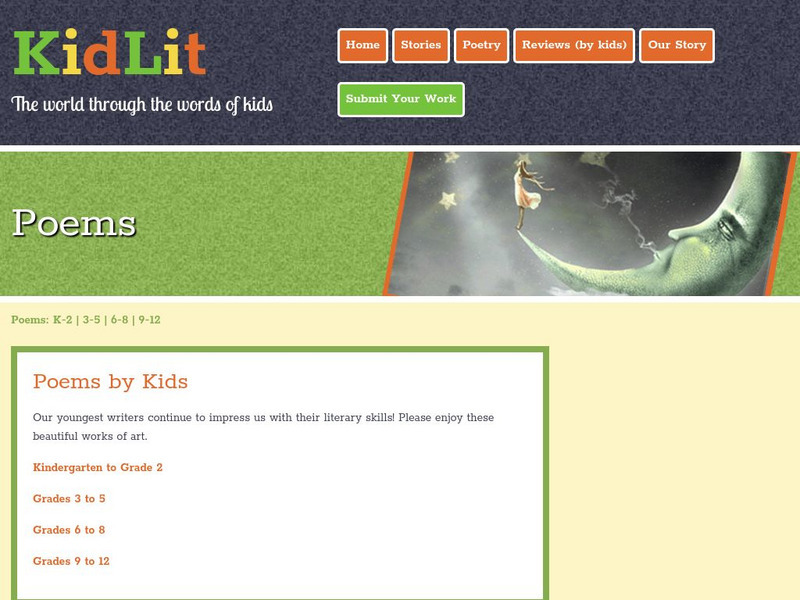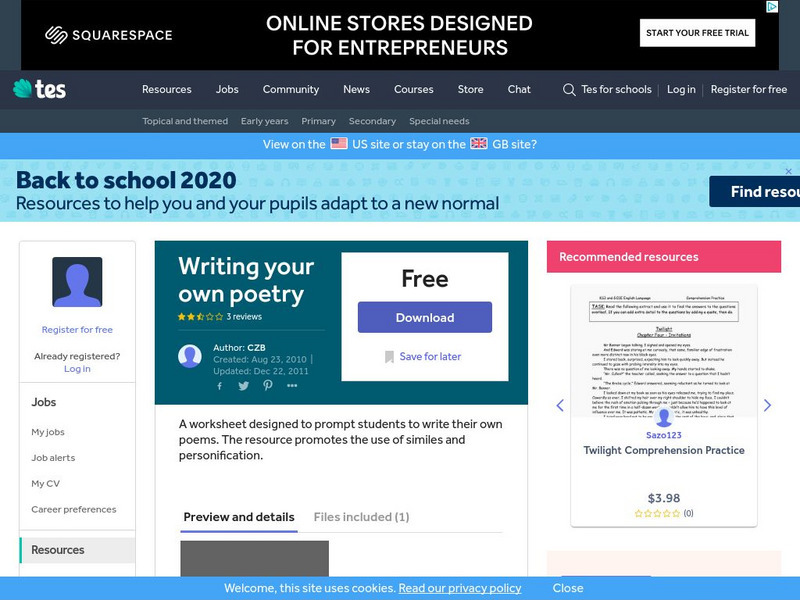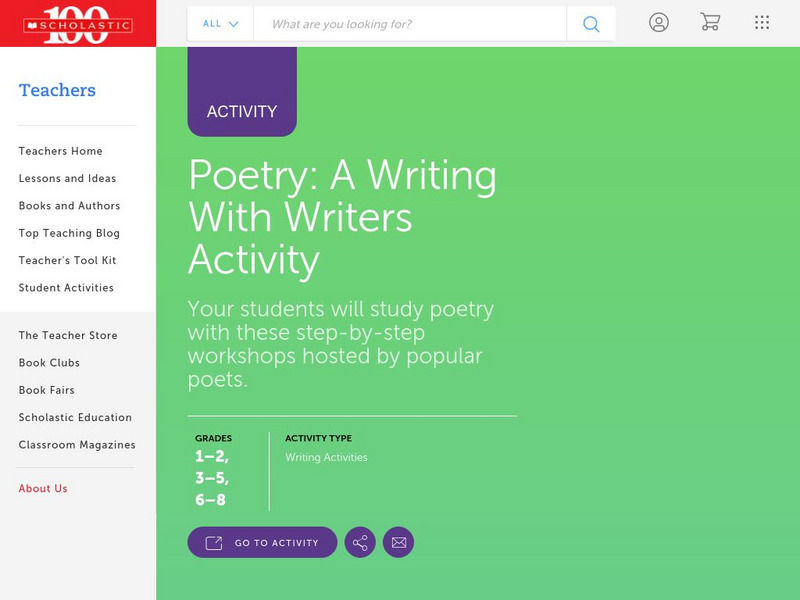ReadWriteThink
Read Write Think: Compiling Poetry Collections and a Working Definition of Poetry
Contains plans for eight lessons in a poetry unit that asks students to write poetry in various forms after reading models. In addition to objectives and standards, this instructional plan contains links to sites used in the lessons as...
University of Victoria (Canada)
The U Vic Writer's Guide: Literary Term: Ballad
The University of Victoria's English department gives a comprehensive definition of the "ballad" poetic form. Short examples included.
University of Victoria (Canada)
The U Vic Writer's Guide: Literary Term: Drama
The University of Victoria's English department gives a comprehensive definition of "drama" in writing.
University of Victoria (Canada)
The U Vic Writer's Guide: Literary Term: Elegy
The University of Victoria's English department gives a comprehensive definition of the "elegy" poetic form. Example included.
University of Victoria (Canada)
The U Vic Writer's Guide: Literary Term: Epics
The University of Victoria's English department gives a comprehensive definition of the "epic" poetic form. Short examples included.
University of Victoria (Canada)
The U Vic Writer's Guide: Literary Term: Ode
The University of Victoria's English department gives a comprehensive definition of the "ode" poetic form. Short examples included.
Writing Fix
Writing Fix: Color Personification Poems
In this activity, Hailstones and Halibut Bones, a book written by Mary O'Neill and Red Sings, and From Treetops: a Year in Colors, a book by Joyce Sidman, are used as mentor texts. Students will brainstorm to collect different...
Writing Fix
Writing Fix: The Di Ku And/or the Tri Ku [Pdf]
Students use a basic haiku structure to create di-ku and tri-ku poems to demonstrate understanding of a topic. Directions and examples of each are provided.
Writing Fix
Writing Fix: A Poem for Two Voices [Pdf]
In this lesson students write in contrasting voices to create a descriptive poem.
ReadWriteThink
Read Write Think: All About Alliteration: Responding to Literature Through Poetry
In this lesson, students will listen to a book, A My Name Is by Alice Lyne, and they will learn about alliteration and alliterative words. After reading the book, students will use print and online resources to brainstorm their own...
Yale University
Yale New Haven Teachers Institute: Poetry for the Elementary Classroom
Site contains a narrative and three lesson plans. These plans are designed to assist learners with various aspects of poetry. This site discusses strategies which enable students to effectively, memorize, recite, and correctly pronounce...
Other
Poetry Archive: Homepage
The Poetry Archive serves as a resource for students and teachers alike to listen to poets read their poems aloud. It is organized so that poems can be looked up by the title or the poet. Includes a teacher section, a student section, a...
Other
Kids Lit: Poems by Kids
Student poets have contributed their poems for publication on this site. Read through the poems and contribute your own.
TES Global
Tes: Writing Your Own Poetry
[Free Registration/Login Required] Students can write a poem that incorporates personification and similes with the help of this template.
Scholastic
Scholastic Instructor: Poetry Workshop
This site features information on a poetry workshop where students learn to "grow their poetry." The ideas are well summarized and easy to follow.
Scholastic
Scholastic: Poetry: A Writing With Writers Activity
Interactive poetry lessons with well-known authors for three age groups including first through fourth grades with Jack Prelutsky, second through fifth grades with Jean Marzollo, and fourth through eighth grade with Karla Kuskin.
Read Works
Read Works: 3rd Grade Lesson: Poetry
[Free Registration/Login Required] A lesson plan in which students use two provided poems to learn to identify and understand the use of similes and metaphors in poetry. Lesson includes direct teaching, guided practice, and independent...
Read Works
Read Works: Fourth Grade: Two Lesson Unit: Voice
[Free Registration/Login Required] A two-lesson unit on theme where students use the book Poetry for Young People: Langston Hughes to find examples of author's voice in poetry, and the book The Random House Book of Poetry for Children to...
Other
Poetry4 Kids: Poetry Lessons
This resource offers guidance through the writing process of writing funny poetry. There are instructions on how to write a clerihew and an exaggeration poem.
Writing Fix
Writing Fix: Little Toy Friend Poems
In this lesson students will create a poem from the viewpoint of a lost toy.
Education.com
Education.com: Rl.4.5 Worksheets: Explain Major Differences Between Poems, Drama
[Free Registration/Login Required] A site with links to 8 worksheets that can be downloaded and printed for student use while building skills with standard RL.4.5: Explain major differences between poems, drama, and prose, and refer to...
ArtsNow
Arts Now Learning: Poetry in Motion [Pdf]
For this lesson, students learn about and create sequences and patterns as they move and dance.
Poetry Foundation
Poetry Foundation: All Good Slides Are Slippery
An article from Poetry Magazine by Lemony Snicket, aka Daniel Handler, presents a portfolio of poetry from authors of many different times and places. In addition to the poems themselves, he discusses why he chose certain poems for this...
Alabama Learning Exchange
Alex: Clerihew Poetry
Cooperative poetry writing assignment. Students will write and share poetry using the Clerihew style. Students will also give a group presentation of their poems.
















